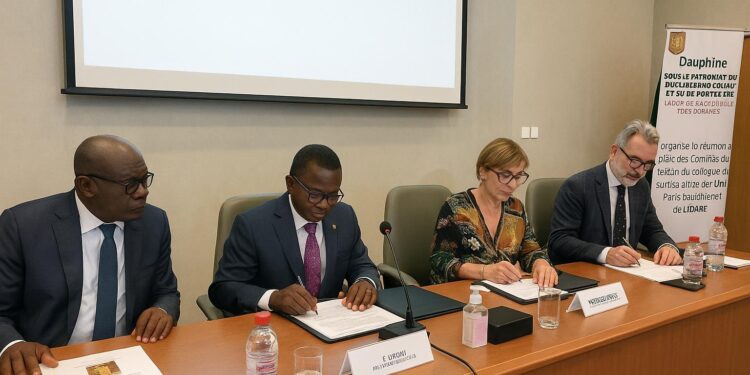Brazzaville prepares a pan-African fiscal summit
From 9 to 12 September, Brazzaville will move centre-stage for African fiscal debates as it hosts the eighth International Tax Colloquium. The meeting is co-organised by the Directorate-General of Taxes and Domains of the Republic of Congo and the renowned Master 227 programme of Paris-Dauphine University.
Fifteen countries are expected to send delegations of academics, tax advisers, chartered accountants and senior officials. According to the organising committee, the objective is clear: exchange concrete ideas that help African states capture domestic revenues more effectively while safeguarding economic stability.
Theme highlights national tax law’s strategic role
The 2024 edition carries the theme “Role and Place of National Tax Law: Challenges of Revenue Mobilisation and Sustainability”. The wording signals two priorities shared across the continent: boosting collections in a context of limited external financing, and doing so without sacrificing social or environmental standards.
Organisers underline that discussions will remain strictly technical and solution-oriented. Congolese authorities view the forum as an opportunity to showcase recent administrative upgrades and to learn from peer reforms executed in West, Central and Southern Africa.
Extractive-sector revenues under the microscope
One of three main axes scrutinises how to secure a larger, steadier share of profits generated by oil, gas and mining projects. Speakers will dissect contractual, transfer-pricing and audit tools that have proven effective elsewhere, while weighing their adaptability to diverse legal traditions.
For Congo-Brazzaville, hydrocarbon proceeds remain a cornerstone of public finance. Better aligning fiscal take with market cycles can reinforce macroeconomic resilience, a consideration likely to resonate with investors monitoring sovereign risk profiles.
Sustainability and living resources
A second axis zooms in on living resources—from forestry to fisheries—where long-term value often slips through under-reported volumes and opaque chains. Specialists will debate incentive structures that encourage compliance while protecting biodiversity, especially in the vast Congo Basin.
Participants note that workable solutions require coordination among tax, customs and environmental agencies. Case studies from Cameroon and Gabon are scheduled to illustrate how digital traceability platforms can cut revenue leakages and promote responsible harvesting.
Modernising the fight against tax crime
The third axis addresses tax delinquency and the administrative redesign needed to combat it. Panels will explore risk-based audits, data analytics and regional information exchange as methods to deter fraud without paralysing routine business.
Congolese officials anticipate benefiting from comparative insights into human-resource reform, including merit-based promotion and continuing education. Such measures, they argue, help build credibility with taxpayers and international partners alike.
Practitioner workshops for actionable takeaways
Beyond plenary sessions, themed workshops will mix administrators, entrepreneurs and academics. Organisers promise frank dialogue on balancing enforcement with a trust-based relationship between enterprises and the tax authority.
Early registration data suggest strong corporate interest, notably from logistics and telecommunications firms that value predictability in compliance costs. Outcomes could feed directly into forthcoming amendments to Congolese tax procedures.
Alumni networks reinforce professional bonds
On 10 September, a dedicated alumni evening will gather Paris-Dauphine graduates operating across Central Africa. The reunion aims to deepen a community capable of rapid knowledge sharing on fiscal innovation.
Representatives from the Democratic Republic of Congo, Chad, Cameroon and the Central African Republic have confirmed attendance. Organisers believe that peer-to-peer exchanges outside formal sessions accelerate adoption of tested practices.
International partners lend support and scrutiny
The colloquium enjoys backing from the Agence Française de Développement, the European Union and the World Bank. Their presence underlines how domestic revenue mobilisation has become central to development-finance strategies.
According to Maxence Bringuier, president of the Dauphine Tax Administration Association, the event offers “an ideal framework to share synergies between international expertise and national priorities”, a sentiment echoed by several donor representatives in pre-event briefings.
Implications for investors and lenders
For investors, the forum’s focus on clearer, more predictable rules can translate into reduced compliance uncertainty. Lenders likewise track improvements in tax administration as leading indicators of sovereign creditworthiness.
Congolese authorities have signalled openness to public-private dialogue during the event, a gesture likely to reassure companies on issues ranging from advance rulings to dispute resolution timelines.
Master 227: training tomorrow’s fiscal leaders
Master 227, formally titled “Administration, Governance and Tax Law”, blends rigorous academic teaching with field placements inside revenue administrations. Its students form the backbone of the colloquium’s logistical team, gaining hands-on experience in high-level policy debate.
The programme’s alumni already occupy strategic posts in several African ministries, fostering a network that supports continuous reform and professional mobility.
A platform for pragmatic cooperation
Observers stress that the colloquium is not merely an academic exercise. Joint communiqués released after previous editions have fed into national budget laws and treaty negotiations. Organisers intend to publish a compendium of this year’s recommendations within six weeks of closing.
Such deliverables give the meeting operational relevance, strengthening its reputation as a problem-solving laboratory rather than a ceremonial gathering.
Government stance: constructive engagement
The Congolese government positions the event as proof of its commitment to transparent and modern public finance management. Senior officials are scheduled to speak on opening day, emphasising the alignment of tax reforms with the country’s broader economic diversification agenda.
By hosting the forum, Brazzaville also reinforces its profile as a regional knowledge hub, complementing existing initiatives in energy and digital regulation.
Expectations for measurable impact
Participants will monitor follow-through on workshop proposals, from updated transfer-pricing guidelines to streamlined e-filing platforms. Progress reports are expected at next year’s edition, instilling a culture of accountability.
Stakeholders argue that incremental but steady gains in collection efficiency can finance infrastructure, social services and climate resilience without overburdening taxpayers.
Looking ahead
As September approaches, logistical preparations accelerate, with hybrid participation options under consideration to widen access. Organisers remain confident that the event will deliver actionable insights tailored to the realities of African administrations.
If the agenda is met, the Brazzaville colloquium could serve as a template for cooperative, data-driven fiscal governance across the continent.












































